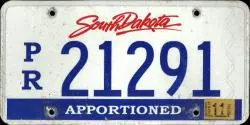Apportioned Plates in South Dakota

The International Registration Plan (IRP) is a cooperative agreement among the U.S., Canadian provinces, and the District of Columbia that facilitates the equitable distribution of registration fees based on mileage driven in each jurisdiction.
South Dakota is a participating member, meaning that any trucking company based in the state and operating across state or provincial lines must register under the IRP. If you’re a carrier looking to stay compliant and operate legally in multiple jurisdictions, this guide will walk you through the South Dakota-specific IRP requirements, rules, and step-by-step registration process.
Who Needs to Register for IRP in South Dakota
Under South Dakota law, IRP registration is required for commercial vehicles that:
- Have a gross vehicle weight (GVW) over 26,000 pounds, or
- Have three or more axles, regardless of weight, or
- Are used in combination and the combined weight exceeds 26,000 pounds.
Additionally, these vehicles must operate in two or more IRP member jurisdictions. It's important to note that vehicles used exclusively within South Dakota (intrastate operations) do not need IRP registration. However, once a commercial vehicle crosses into another state or province for business, it must be properly apportioned under IRP to avoid fines or delays.

South Dakota IRP Documentation
To register under the International Registration Plan (IRP) in South Dakota, carriers must meet several key requirements and provide specific documentation. First, applicants must show proof of residency or an established place of business in South Dakota, such as a utility bill, lease agreement, or business license. An active USDOT Number registered to the company is required, along with proof of insurance that meets both federal and state minimum coverage standards.
Each vehicle must have a valid title or a Manufacturer’s Statement of Origin (MSO). If the vehicle exceeds 55,000 pounds in gross weight, carriers must also submit proof of payment for the Heavy Vehicle Use Tax (HVUT) using IRS Form 2290 with Schedule 1. A current MCS-150 form (Motor Carrier Identification Report) must be on file, and carriers must complete the IRP Application along with Schedule A/E forms, which detail jurisdictional mileage and fleet data.
If a third party is submitting documents on behalf of the carrier,(this is also about IFTA) a signed Power of Attorney is also required. South Dakota mandates that all fees be paid in full before apportioned plates are issued. These fees are calculated based on the percentage of miles traveled in each participating jurisdiction.
The Process for IRP Registration in South Dakota
Registering for IRP in South Dakota involves a straightforward process designed to ensure compliance and proper fee distribution. First, carriers must create a Motor Carrier Account with the South Dakota Department of Revenue’s Motor Vehicle Division. Once the account is established, the next step is to gather all required documentation. The full application package must then be submitted to the IRP office in Pierre, either by mail or in person. Upon submission, applicants must pay all apportioned registration fees upfront, based on their declared routes and fleet details. Once the paperwork and payment are approved, carriers will receive their apportioned license plates and a cab card, listing all authorized jurisdictions and registered weight limits.
Tip: Carefully review all documents before submission. Common errors such as incorrect Vehicle Identification Numbers (VINs), missing mileage estimates, or unsigned forms can cause significant delays in processing your application.
Renewal Process in South Dakota
IRP registrations in South Dakota must be renewed annually, with the renewal month determined by the original month of account activation. The South Dakota Motor Vehicle Division provides advance renewal notifications, and carriers are encouraged to use the state’s online portal to streamline the process.
During renewal, carriers must update mileage records, verify current fleet information, and pay apportioned fees based on the latest operational data. Late renewals may result in penalties and can lead to a lapse in registration, which could subject carriers to enforcement actions such as fines, impoundments, or denied access to other jurisdictions. Staying on top of renewal timelines ensures continued compliance and uninterrupted operations.
Penalties for Non-Compliance in South Dakota
Operating a commercial vehicle without proper IRP registration in South Dakota can lead to significant penalties. Carriers who fail to comply may be subject to fines or citations, vehicle impoundment, and even revocation of their operating authority.
In addition, non-compliant carriers risk being denied access to other IRP jurisdictions, severely limiting their ability to operate across state lines. Enforcement officers frequently conduct inspections at weigh stations and roadside checkpoints, checking for valid cab cards and apportioned license plates. Staying compliant with IRP requirements not only helps you avoid these penalties but also ensures your operations continue smoothly and legally throughout all participating jurisdictions.
How Our Services Help With South Dakota IRP Registration
Navigating IRP paperwork can be time-consuming and complicated but that’s where we come in. Our team specializes in managing the entire IRP registration process, from preparing the initial documentation to submitting it in accordance with South Dakota's specific regulations. Whether you're registering your first vehicle or renewing a multi-truck fleet, we help you avoid errors, save time, and maintain compliance.
By handling the details, we allow you to focus on running your business without worrying about missed deadlines or incorrect filings. Don’t let administrative hurdles delay your operations with our expert assistance, your South Dakota IRP registration is completed quickly, accurately, and hassle-free. Call us today at (888) 202‑4927 to get started with your IRP registration.
